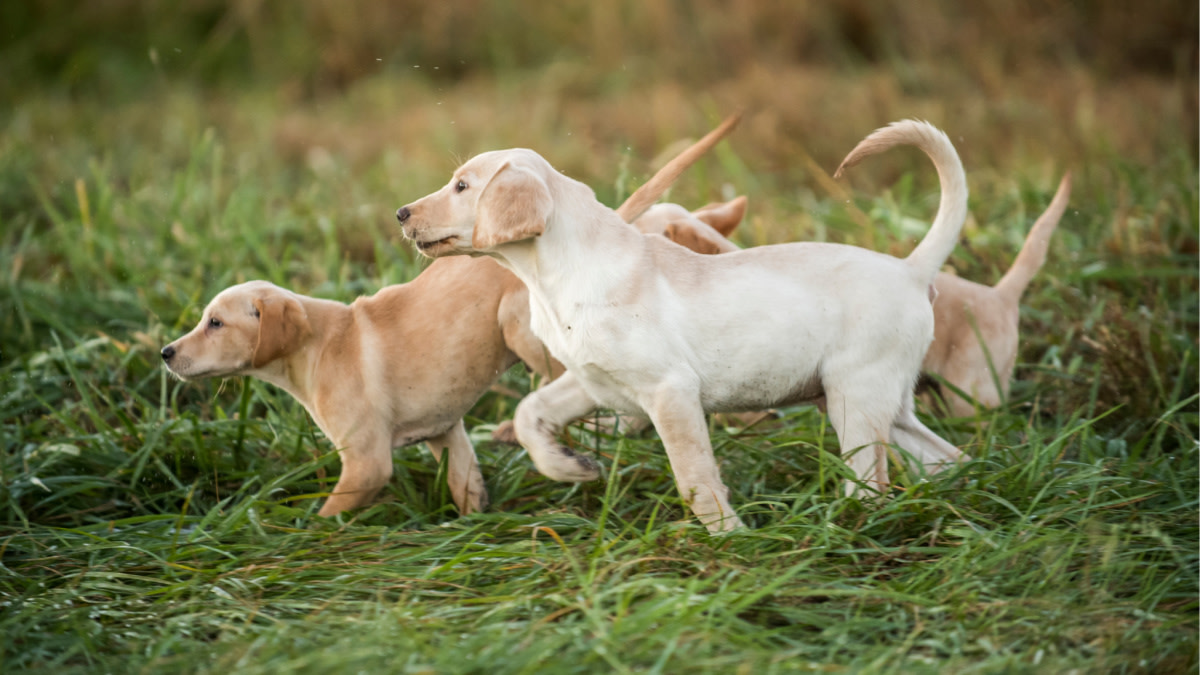
Training and fieldwork creates a special kind of bond between a dog and its owner. But our four-legged friends often find themselves in situations where they need your help. Our Ask a Vet series delivers advice directly from a professional, working veterinarian.
After years of training, hunting, and creating a lengthy anthology of memories together, it’s natural for bird dog owners to stand back, admire their work, and contemplate a plan for their dog’s succession.
For some, the idea of having their male hunting dog sire a litter emerges as a reasonable means of bottling up that emotional attachment and securing it well into the future. For others, it provides a well-intentioned but misguided attempt at making a carbon copy of your best friend.
As a bird hunting veterinarian who devotes a large portion of his practice to reproduction, I serve as a sounding board for hunters who find themselves in this very predicament.
I give them all the same answer: The choice to engage in breeding—whether you’re supplying the semen or raising the litter—should be considered with a critical eye and backed by a solid plan. After a healthy dose of self-reflection, I encourage owners to decide whether their desire to breed stems from one of the following common, short-sighted motivators.
“I want him to sire a litter before he’s neutered.”
Naturally, we view our world through the lens of a human, and it’s understandable that we’re prone to anthropomorphism when it comes to our bird dogs. While all animals possess a strong desire to procreate and spread their DNA, it’s a considerable stretch to presume that a male dog must mate at least once to affirm his masculinity.
Testosterone has been clouding male judgement for millennia, so it makes sense that a few outspoken members of the hormone-fueled brotherhood would exclaim that a dog hasn’t experienced the full richness of life without engaging in intercourse. Empathy, no matter how strong its pull, should not be on your list of reasons to contribute to a litter of pups.
I don’t mean to chastise anyone for wanting to give ol’ Duke a chance to sow his oats before castration. However, when I hear this justification (and believe me, it’s a common one) I always ask: “Why even neuter a dog you think of highly enough to breed?”
“I want another dog just like him.”
While I don’t think this group of bird dog owners confuses cloning with breeding, there exists a commonly held misconception that keeping a son of your bird dog will offer as close to a carbon copy as Mother Nature provides.
This perspective has a couple of major flaws. First—and I’ll just be blunt here—creating an entire litter of pups because you only want one teeters on the edge of unethical. When I encounter this scenario in practice, I always ask the potential breeder about their plan to find suitable hunting homes for the rest of these hard-charging bird dog puppies they wish to replicate.
It’s a legitimate consideration since most hunting breeds have a reputation for high fecundity, meaning that you might need to find 12 or more homes for the other pups.
Secondly, if you think that the apple doesn’t fall far from the tree, keep in mind that occasionally the apple hits the ground and rolls a considerable distance. Sure, this strategy seems to have worked well for the Manning Family, but your new pup created in the image of his father may just as likely look, act, and hunt like its mother.
If you’re still set on a pup that closely resembles the one you have now, go back to the reputable breeder where you bought him. Perhaps another litter from the same sire and dam is in the works.
“He’s a fantastic hunting dog.”
I can’t over-emphasize the amount of hard work that goes into producing quality gun dog puppies.
Conscientious breeders strive to better the breed by competing, trialing, testing, and health screening their stud dogs, often at the considerable expense of time and money. If a dog excels in all these venues, only then is he cleared to pass along his genetics.
The Germans seem to have cornered the market on this philosophy, but their insistence upon upholding a high standard for animals approved for breeding all but guarantees each new pup will develop into a serious bird-finding machine.
Conclusion
A stubborn and often prideful bunch, we bird dog owners have an inherent bias about the talent of our own dogs. A healthy dose of self-reflection as to whether your breed benefits by the addition of your male’s genes should be a prerequisite for taking the plunge into breeding.
The fact that he’s the best dog you’ve ever seen or hunted over doesn’t provide enough justification, particularly if your sample size isn’t very large.
For the majority that find themselves on the fence about campaigning a stud dog, I usually recommend restraint. Let those already breeding responsibly continue to invest the hard work and money into the challenging task of producing quality bird dogs.
Feature image via John Hafner.




Conversation